The Book of Glory (12:1–20:31)
Jesus Anointed at Bethany (12:1-11)
Jesus is staying with Lazarus, Mary, and Martha in Bethany six days before the Passover.
During a meal, Mary comes to him and pours a pint of pure nard (perfume) on Jesus feet and then wipes his feet with her hair.
 Judas gets mad and yells, “Why wasn’t this perfume sold and the money given to the poor? It was worth a year’s wages!”
Judas gets mad and yells, “Why wasn’t this perfume sold and the money given to the poor? It was worth a year’s wages!”
But John writes that Judas only said this because he loved money and not because he loved the poor.
He also says that Judas was like in charge of the group’s money, and he used to help himself to the moneybag whenever he wanted.
Jesus tells Judas to leave her alone because she has saved this perfume for the day of his burial.
He adds, “You will always have the poor among you, but you will not always have me.”
Meanwhile a large crowd of Jews found out that Jesus was there and came, not only because of him but also to see Lazarus, whom he had raised from the dead.
So the chief priests made plans to kill Lazarus as well, for on account of him many of the Jews were going over to Jesus and believing in him.
Jesus Comes to Jerusalem as King (12:12-19)
The next day, Jesus rides into Jerusalem on a donkey, and the crowds follow him with palm branches and praise him, shouting, “Hosanna!”
John writes that all this took place to fulfill what the prophets had said, but his disciples didn’t realize this until after Jesus was glorified.
The crowds followed Jesus because he had raised Lazarus from the dead, and the Pharisees shook their heads and said, “See, this is getting us nowhere. Look how the whole world has gone after him!”
Jesus Predicts His Death (12:20-36)
There were some Greeks visiting the city, and they asked Philip if he could take them to see Jesus.
Philip took them to Andrew and Andrew took them to Jesus.
Jesus replied, “The hour has come for the Son of Man to be glorified. Very truly I tell you, unless a kernel of wheat falls to the ground and dies, it remains only a single seed. But if it dies, it produces many seeds. Anyone who loves their life will lose it, while anyone who hates their life in this world will keep it for eternal life. Whoever serves me must follow me; and where I am, my servant also will be. My Father will honor the one who serves me.”
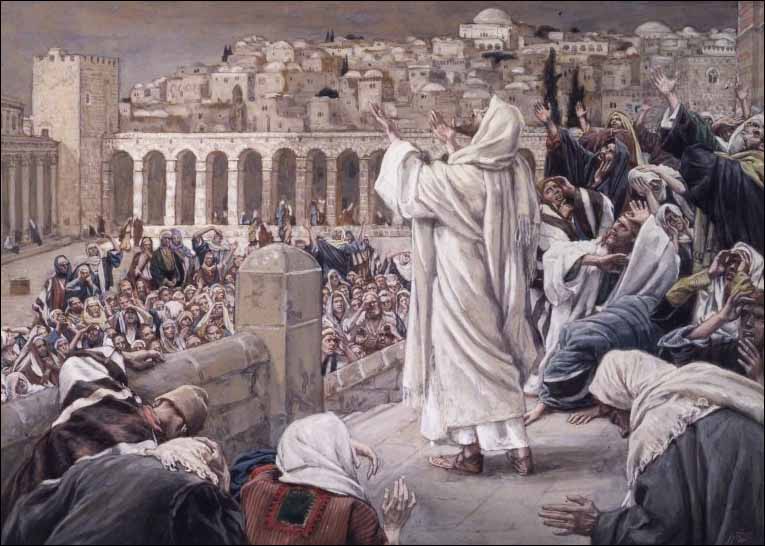 Suddenly, Jesus confesses that he is terrified over what is about to happen to him, and he’s like, “What should I do? Should I tell my Father to save me from the hour at hand?”
Suddenly, Jesus confesses that he is terrified over what is about to happen to him, and he’s like, “What should I do? Should I tell my Father to save me from the hour at hand?”
But then he cries out, “No! It was for this very reason I came to this hour!”
And instead of begging his Father to save him, he cries out, “Father! Glorify your name!”
Suddenly, a voice came from heaven, saying, “I have glorified it! And I will glorify it again!”
The crowd that was there and heard the voice said it had thundered, and others said an angel had spoken to him.
Jesus tells them that the voice was for their benefit and not his, because the time has come to judge the world and to drive out its prince.
He adds, “And I, when I am lifted up from the earth, will draw all people to myself.”
John says that he said this to show the kind of death he was going to die.
The crowd said, “We have heard from the Law that the Messiah will remain forever, so how can you say, ‘The Son of Man must be lifted up’? Who is this ‘Son of Man’?”
Then Jesus told them, “You are going to have the light just a little while longer. Walk while you have the light, before darkness overtakes you. Whoever walks in the dark does not know where they are going. Believe in the light while you have the light, so that you may become children of light.”
When he had finished speaking, Jesus left and hid himself from them.
Belief and Unbelief Among the Jews (12:37-50)
John says that even after all the miracles Jesus had performed, the Jews still didn’t believe in him, fulfilling Isaiah’s prophesy about them.
John also says that there were actually many religious leaders who believed in Jesus, but they didn’t admit it because the Pharisees had threatened to throw the followers of Jesus out of the synagogue.
Then Jesus cried out, “Whoever believes in me does not believe in me only, but in the one who sent me! The one who looks at me is seeing the one who sent me! I have come into the world as a light, so that no one who believes in me should stay in darkness!”
He adds, “If anyone hears my words but does not keep them, I do not judge that person. For I did not come to judge the world, but to save the world. There is a judge for the one who rejects me and does not accept my words; the very words I have spoken will condemn them at the last day. For I did not speak on my own, but the Father who sent me commanded me to say all that I have spoken. I know that his command leads to eternal life. So whatever I say is just what the Father has told me to say.”
The Last Supper and Farewell Discourses
Jesus Washes His Disciples’ Feet (13:1-17)
Jesus celebrates a Passover meal with his disciples, and John tells us that Jesus knew that the Father had handed all power over to him and that it was time to return to the Father.
John also mentions that the devil had already given Judas the idea of betraying Jesus.
Jesus gets up from the meal, wraps a towel around his waist, and begins washing his disciples feet.
It was customary at the time for servants to wash the feet of the guests of the meal.
Jesus tries to wash Peter’s feet and Peter asks him why he’s doing this.
Jesus tells him that he will understand why later.
Peter objects, but Jesus tells him that unless he lets him wash him he will have no part in him.
Peter then declares that Jesus shouldn’t only wash his feet, but the rest of him as well.
But Jesus tells him that people who have already bathed only need their feet washed.
He tells the disciples that they have been cleansed… except for some of them… because he knew that Judas was plotting against him.
After Jesus is done washing their feet, he puts his clothes back on and returns to the table.
He tells them that they should follow his example and wash each other’s feet just as he washed their feet.
He adds, “No servant is greater than his master, nor is a messenger greater than the one who sent him.”
Jesus Predicts His Betrayal (13:18-30)
Jesus then reiterates that one of the disciples… one who shares this bread with him… will betray him.
He says that this is to fulfill what was predicted in Psalm 41.
He says that he’s telling them what is about to happen so that they will believe in him… because whoever accepts him accepts the One who sent him.
The disciples then begin to wonder which one of them he is talking about.
The text says that “The disciple whom Jesus loved” (probably John) was sitting next to Jesus, so Peter motioned to him to ask Jesus who he was talking about.
Jesus answered, “It is the one to whom I will give this piece of bread when I have dipped it in the dish.”
He gave it to Judas, and the text says that as soon as Judas took the bread, Satan entered into him.
So Jesus told him, “What you are about to do, do quickly.”
But no one at the meal understood why Jesus said this to him. Since Judas had charge of the money, some thought Jesus was telling him to buy what was needed for the festival, or to give something to the poor.
As soon as Judas had taken the bread, he went out. And it was night.
Jesus Predicts Peter’s Denial (13:31-38)
After Judas leaves, Jesus declares that because he himself has been glorified, God is glorified; and when God is glorified, he himself is glorified in God.
 He warns them that he will be with them for only a little while longer, and they are not able to go where he is going.
He warns them that he will be with them for only a little while longer, and they are not able to go where he is going.
Jesus says, “A new command I give you: Love one another. As I have loved you, so you must love one another. By this everyone will know that you are my disciples, if you love one another.”
Peter asks, “Lord, where are you going?”
Jesus replies, “Where I am going, you cannot follow now, but you will follow later.”
Peter asks, “Lord, why can’t I follow you now? I will lay down my life for you!”
Then Jesus answers, “Will you really lay down your life for me? Very truly I tell you, before the rooster crows, you will disown me three times!”
Jesus Comforts His Disciples (14:1-31)
 Jesus says to them, “Do not let your hearts be troubled. You believe in God; believe also in me. My Father’s house has many rooms; if that were not so, would I have told you that I am going there to prepare a place for you? And if I go and prepare a place for you, I will come back and take you to be with me that you also may be where I am. You know the way to the place where I am going.”
Jesus says to them, “Do not let your hearts be troubled. You believe in God; believe also in me. My Father’s house has many rooms; if that were not so, would I have told you that I am going there to prepare a place for you? And if I go and prepare a place for you, I will come back and take you to be with me that you also may be where I am. You know the way to the place where I am going.”
What Jesus is saying here reflects aspects of ancient marriage practices, where the wife moved in with the husband in an insula – a house added on to his parents’ house.
Each son would add a few rooms to the house so that multiple generations, aunts, uncles, and cousins all lived in the same complex.
Each son would add a few rooms to the house so that multiple generations, aunts, uncles, and cousins all lived in the same complex.
Girls married at around 14 or 15 and the husband would have been in his mid-20s. His family would pay the “bride price” or dowry. The husband would go home to prepare a place for her — which may take months or years. During this time, she was one who was “bought with a price.” Paul’s similar words to the Christians were much like a groom’s words to his fiancée.
The bride did not know when her groom would come for her. She just had to be ready. When the insula was finished, the groom and his friends would go to get his bride. They would gather in the courtyard, the man took the woman into their home and consummated the wedding. The best man would stand outside the door and announce when they were married (when consummation occurred). This would trigger a long celebration with family and friends.
This is also where John the Baptist had come up with the parable of Jesus as the groom and himself as the best man, when John says that his “joy is made complete” at the “coming” of Jesus as the bridegroom.
Thomas pipes up and says, “Lord, we don’t know where you’re going, so how can we know the way?”
Jesus answered, “I am the way and the truth and the life. No one comes to the Father except through me. If you really know me, you will know my Father as well. From now on, you do know him and have seen him.”
Philip said, “Lord, show us the Father and that will be enough for us.”
Jesus is like, “Don’t you know me, Philip, after all this time?”
He tells Philip that he has already seen the Father because he has seen the Son.
Jesus also says, “Whoever believes in me will do the works I have been doing, and they will do even greater things than these, because I am going to the Father. And I will do whatever you ask in my name, so that the Father may be glorified in the Son. You may ask me for anything in my name, and I will do it.”
Jesus adds, “If you love me, keep my commands. And I will ask the Father, and he will give you another advocate to help you and be with you forever— the Spirit of truth. The world cannot accept him, because it neither sees him nor knows him. But you know him, for he lives with you and will be in you. I will not leave you as orphans; I will come to you. Before long, the world will not see me anymore, but you will see me. Because I live, you also will live. On that day you will realize that I am in my Father, and you are in me, and I am in you. Whoever has my commands and keeps them is the one who loves me. The one who loves me will be loved by my Father, and I too will love them and show myself to them.”
Then Judas (not Judas Iscariot) said, “But, Lord, why do you intend to show yourself to us and not to the world?”
 But Jesus tells him that all who love him will know him, and he and the Father will come and make their home with them.
But Jesus tells him that all who love him will know him, and he and the Father will come and make their home with them.
He adds, “All this I have spoken while still with you. But the Advocate, the Holy Spirit, whom the Father will send in my name, will teach you all things and will remind you of everything I have said to you. Peace I leave with you; my peace I give you. I do not give to you as the world gives. Do not let your hearts be troubled and do not be afraid.”
Around this point, Jesus gets up from the table and they all leave.
The Vine and the Branches (15:1-17)
 “I am the true vine, and my Father is the gardener. He cuts off every branch in me that bears no fruit, while every branch that does bear fruit he prunes so that it will be even more fruitful…”
“I am the true vine, and my Father is the gardener. He cuts off every branch in me that bears no fruit, while every branch that does bear fruit he prunes so that it will be even more fruitful…”
“I am the vine; you are the branches. If you remain in me and I in you, you will bear much fruit; apart from me you can do nothing. If you do not remain in me, you are like a branch that is thrown away and withers; such branches are picked up, thrown into the fire and burned…”
“My command is this: Love each other as I have loved you. Greater love has no one than this: to lay down one’s life for one’s friends. You are my friends if you do what I command. I no longer call you servants, because a servant does not know his master’s business. Instead, I have called you friends, for everything that I learned from my Father I have made known to you. You did not choose me, but I chose you and appointed you so that you might go and bear fruit—fruit that will last—and so that whatever you ask in my name the Father will give you. This is my command: Love each other.”
The World Hates the Disciples (15:18-25)
“If the world hates you, keep in mind that it hated me first.”
“If they persecuted me, they will persecute you also.”
“Whoever hates me hates my Father as well. If I had not done among them the works no one else did, they would not be guilty of sin. As it is, they have seen, and yet they have hated both me and my Father. But this is to fulfill what is written in their Law: ‘They hated me without reason.’”
The Work of the Holy Spirit (15:26–16:15)
“When the Advocate comes, whom I will send to you from the Father—the Spirit of truth who goes out from the Father—he will testify about me. And you also must testify, for you have been with me from the beginning.”
“All this I have told you so that you will not fall away. They will put you out of the synagogue; in fact, the time is coming when anyone who kills you will think they are offering a service to God. They will do such things because they have not known the Father or me.”


“But very truly I tell you, it is for your good that I am going away. Unless I go away, the Advocate will not come to you; but if I go, I will send him to you. When he comes, he will prove the world to be in the wrong about sin and righteousness and judgment: about sin, because people do not believe in me; about righteousness, because I am going to the Father, where you can see me no longer; and about judgment, because the prince of this world now stands condemned.”
“I have much more to say to you, more than you can now bear. But when he, the Spirit of truth, comes, he will guide you into all the truth. He will not speak on his own; he will speak only what he hears, and he will tell you what is yet to come. He will glorify me because it is from me that he will receive what he will make known to you. All that belongs to the Father is mine.”
The Disciples’ Grief Will Turn to Joy (16:16-33)
Jesus again says that in a little while the disciples won’t see him anymore, but the disciples are still confused as to what Jesus is talking about, so Jesus tells them that very soon the world will rejoice while they mourn.
He tells them that they will grieve, but they will see him again and they will rejoice when they see him and the joy they will receive is not something that the world is able to take away from them.
He also tells them that one day he will no longer speak to them figuratively about the Father, but will speak plainly about Him – and not only because Jesus has an in with the Father, but because they love and know Jesus, they also have an in with the Father… because they have met him in Jesus.
The disciples are like, “Finally! You’re not speaking in metaphors anymore! Now we know that you know all things! You know our questions before we ask them!”
Jesus is like, “So you believe me now, do you? We’ll see about that. Pretty soon all of you will be scattered and leave me all alone… but I’m not alone… because my Father is with me.”
The Prayer of Jesus (17:1-26)
Jesus prays that he will be glorified as the Son so that the Father may also be glorified.
He says that the Father gave the Son the authority to give people eternal life.
But what is eternal life?
Jesus says it is to know the only true God and to know Jesus Christ whom he sent.
Jesus prays, “Father, glorify me in your presence with the glory I had with you before the world began!”
 Jesus then prays for the disciple that God had given him, saying that they have helped to bring him glory, and they will need protection from the world when he is gone.
Jesus then prays for the disciple that God had given him, saying that they have helped to bring him glory, and they will need protection from the world when he is gone.
He prays that the disciples will be one as he and the Father are one.
“My prayer is not that you take them out of the world but that you protect them from the evil one. They are not of the world, even as I am not of it. Sanctify them by the truth; your word is truth. As you sent me into the world, I have sent them into the world. For them I sanctify myself, that they too may be truly sanctified.”
Jesus then prays for everyone who will one day believe the message of the disciples – that they will all be one as he and the Father are one.
The Passion Story
Jesus Arrested (18:1-14)
After praying, Jesus crosses the Kidron Valley with his disciples and they stop at a garden.
Judas knew that Jesus would go there, so he also shows up leading a group of religious leaders and soldiers to arrest Jesus.
They ask for “Jesus of Nazareth” and he says “I am.”
When he says “I am” the mob falls over backwards… including Judas.
Then he’s like, “Who did you say you wanted again?”
And they stand up and say “Jesus of Nazareth” and he says “I told you I am,” and he tells them that if its him they want then they should let the disciples go.
But Peter runs forward with a sword and cuts off the right ear of the high priest’s servant – a guy named Malchus.
Jesus commanded Peter, “Put your sword away! Shall I not drink the cup the Father has given me?”
Then they arrested Jesus and bound him and brought him first to Annas, who was the father-in-law of Caiaphas, the high priest that year.
Caiaphas was the one who had advised the Jewish leaders that it would be good if one man died for the people.
Peter’s First Denial (18:15-18)
Peter and another disciple were following Jesus.
 Because this disciple was known to the high priest, he went with Jesus into the high priest’s courtyard, but Peter had to wait outside at the door. The other disciple came back, spoke to the servant girl on duty there and brought Peter in.
Because this disciple was known to the high priest, he went with Jesus into the high priest’s courtyard, but Peter had to wait outside at the door. The other disciple came back, spoke to the servant girl on duty there and brought Peter in.
She asked Peter if he was also a disciple and he denied it.
It was cold, and the servants and officials stood around a fire they had made to keep warm. Peter also was standing with them, warming himself.
The High Priest Questions Jesus (18:19-24)
Meanwhile, the high priest questioned Jesus about his disciples and his teaching.
Jesus replied, “I always taught in synagogues or at the temple, where all the Jews come together. I said nothing in secret. Why question me? Ask those who heard me. Surely they know what I said.”
When Jesus said this, one of the officials nearby slapped him in the face. “Is this the way you answer the high priest?” he demanded.
“If I said something wrong,” Jesus replied, “testify as to what is wrong. But if I spoke the truth, why did you strike me?”
Then Annas sent him bound to Caiaphas the high priest.
Peter’s Second and Third Denials (18:25-27)
 Meanwhile, Peter was still standing there warming himself. So they asked him, “You aren’t one of his disciples too, are you?”
Meanwhile, Peter was still standing there warming himself. So they asked him, “You aren’t one of his disciples too, are you?”
He denied it, saying, “I am not.”
One of the high priest’s servants, a relative of the man whose ear Peter had cut off, challenged him, “Didn’t I see you with him in the garden?”
Again Peter denied it, and at that moment a rooster began to crow.
Jesus Before Pilate (18:28-40)
Jesus is then taken to Pilate, the Roman Governor, but the Jews refuse to enter the palace because that would make them ceremonially unclean for the Passover meal… they apparently didn’t think plotting murder would also make them ceremonially unclean.
So Pilate has to come out to them to see what in the world they want at that hour of the morning, and he asks them what the charges are against Jesus.
And they say his charge is that he is a criminal.
Seeing as how they can’t find an example of any Roman law that Jesus broke, Pilate tells them all to go away and settle their own problems themselves.
So Pilate has Jesus brought inside where they can talk alone.
Pilate asks, “Are you the king of the Jews?”
Jesus responds, “Did you come up with that yourself, or did you hear that from someone else?”
Pilate’s like, “Am I a Jew? Your own people handed you over to me! What did you do?”
Jesus says, “My kingdom is not of this world. If it were, my servants would fight to prevent my arrest by the Jewish leaders. But now my kingdom is from another place.”
Pilate is like, “So you are a king, then!”
Jesus says, “You say, ‘You’re a king!’ but in fact, the real reason I was born and came into this world was to testify to the truth. Everyone on the side of truth listens to me.”
Pilate’s like, “Oh, what is truth anyway?” And he goes back out to the Jews to reason with them.
At this point we learn that it was traditional for a prisoner to be released once a year at the request of the people. We also learn that there was at this time a known terrorist and murderer locked up in prison named Jesus Barabbas.
Pilate uses this opportunity to ask the crowd who they would like to release – Jesus Barabbas or Jesus Christ?
But the crowd was like, “No! Give us the terrorist! Set Barabbas free!”
Jesus Sentenced to Be Crucified (19:1-16a)
Then Pilate took Jesus and had him flogged.
The soldiers twisted together a crown of thorns and put it on his head.
They clothed him in a purple robe, slapped him in the face, and went up to him again and again, saying, “Hail, king of the Jews!”
Pilate brings Jesus out to the crowd again, insisting that there is no grounds for the death penalty.
But as soon as the chief priests and their officials saw him, they shouted, “Crucify! Crucify!”
But Pilate is like, “You crucify him! I don’t want to!”
The Jewish leaders insisted, “We have a law, and according to that law he must die, because he claimed to be the Son of God.”
When Pilate heard this, he was even more afraid, and he went back inside the palace.
“Where do you come from?” he asked Jesus, but Jesus gave him no answer.
“Do you refuse to speak to me?” Pilate said. “Don’t you realize I have power either to free you or to crucify you?”
Jesus answered, “You would have no power over me if it were not given to you from above. Therefore the one who handed me over to you is guilty of a greater sin.”
From then on, Pilate tried to set Jesus free, but the Jewish leaders kept shouting, “If you let this man go, you are no friend of Caesar. Anyone who claims to be a king opposes Caesar.”
When Pilate heard this, he brought Jesus out and sat down on the judge’s seat at a place known as the Stone Pavement.
John tells us that it was about noon at this point on the Day of Preparation for the Passover.
Pilate says, “Here is your king!” and the people scream, “Crucify!”
Pilate asks them, “Shall I crucify your king?”
And the priest cry out, “We have no king but Caesar!”
So finally Pilate handed him over to them to be crucified.
The Crucifixion of Jesus (19:16b-27)
Carrying his own cross, he went out to the place of the Skull (which in Aramaic is called Golgotha).
There they crucified him, and with him two others—one on each side and Jesus in the middle.
Pilate had a notice prepared and fastened to the cross. It read: JESUS OF NAZARETH, KING OF THE JEWS.
Many of the Jews read this sign, for the place where Jesus was crucified was near the city, and the sign was written in Aramaic, Latin and Greek.
The chief priests of the Jews protested to Pilate, “Do not write ‘The King of the Jews,’ but that this man claimed to be king of the Jews.”
Pilate answered, “What I have written, I have written.”
When the soldiers crucified Jesus, they took his clothes, dividing them into four shares, one for each of them, with the undergarment remaining.
This garment was seamless, woven in one piece from top to bottom.
John says that they liked the undergarment so much that they cast lots to see which one of them would get it and that this fulfilled what was prophesied in Psalm 22.
Near the cross of Jesus stood three Marys - his mother Mary, his mother’s sister, Mary the wife of Clopas, and Mary Magdalene.
When Jesus saw his mother there, and “the disciple whom he loved standing nearby (probably John),” he said to her, “Woman, here is your son,” and to the disciple, “Here is your mother.”
From that time on, this disciple took her into his home.
The Death of Jesus (19:28-37)
Later, Jesus says, “I am thirsty.”
 A jar of wine vinegar was there, so they soaked a sponge in it, put the sponge on a stalk of the hyssop plant, and lifted it to Jesus’ lips.
A jar of wine vinegar was there, so they soaked a sponge in it, put the sponge on a stalk of the hyssop plant, and lifted it to Jesus’ lips.
Jesus says, “It is finished.” And he dies.
Now the Jewish leaders didn’t want the bodies left on the crosses during the Sabbath, so they asked Pilate to have the legs broken and the bodies taken down.
So the soldiers came and broke the legs of the first man who had been crucified with Jesus, and then those of the other.
But when they came to Jesus and found that he was already dead, they didn’t break his legs.
Instead, one of the soldiers pierced Jesus’ side with a spear, bringing a sudden flow of blood and water.
John writes that he himself witnessed this event and he is writing about it so that the reader will come to believe.
He also says that all these things happened to fulfill what the prophets had said:
“Not one of his bones will be broken.”
“They will look on the one they have pierced.”
The Burial of Jesus (19:38-42)
Later, Joseph of Arimathea (who was a secret disciple of Jesus) asked Pilate for the body of Jesus.
He and Nicodemus come and take the body away and cover it with myrrh, spices, and aloes, and wrap it in strips of linen.
At the place where Jesus was crucified, there was a garden, and in the garden a new tomb, in which no one had ever been laid.
Because it was the Jewish day of Preparation and since the tomb was nearby, they laid Jesus there.
The Empty Tomb and Postresurrection Appearances to Mary Magdalene, Peter, and the Beloved Disciple
The Empty Tomb (20:1-10)
Early on the first day of the week, while it was still dark, Mary Magdalene went to the tomb and saw that the stone had been removed from the entrance.
So she came running to Simon Peter and the other disciple, the one Jesus loved, and said, “They have taken the Lord out of the tomb, and we don’t know where they have put him!”
So Peter and the other disciple started for the tomb.
Both were running, but the other disciple outran Peter and reached the tomb first.
He bent over and looked in at the strips of linen lying there but did not go in.
Then Simon Peter came along behind him and went straight into the tomb.
He saw the strips of linen lying there, as well as the cloth that had been wrapped around Jesus’ head.
Finally the other disciple also went inside and he saw and believed even though they didn’t understand.
Jesus Appears to Mary Magdalene (20:11-18)
The disciples leave Mary Magdalene crying at the tomb.
As she wept, she bent over to look into the tomb and saw two angels in white, seated where Jesus’ body had been, one at the head and the other at the foot.
They asked her, “Woman, why are you crying?”
“They have taken my Lord away,” she said, “and I don’t know where they have put him.”
At this, she turned around and saw Jesus standing there, but she did not realize that it was Jesus.
At this, she turned around and saw Jesus standing there, but she did not realize that it was Jesus.
He asked her, “Woman, why are you crying? Who is it you are looking for?”
Thinking he was the gardener, she said, “Sir, if you have carried him away, tell me where you have put him, and I will get him.”
Then Jesus spoke her name, and she looked at him and cried, “Rabbi!”
Jesus tells her not to hold on to him, but to go and tell his brothers that he is going to ascend to their Father.
So Mary goes and tells the disciples that she has seen Jesus and delivers his message to them.
Jesus Appears to His Disciples (20:19-23)
That evening, the disciples are hiding behind locked doors in fear, when Jesus suddenly appears.
He says to them, “Peace be with you.” And he shows them the wounds in his hands and his side. And the disciples are filled with joy.
Again Jesus said, “Peace be with you! As the Father has sent me, I am sending you.”
And with that he breathed on them and said, “Receive the Holy Spirit.
If you forgive anyone’s sins, their sins are forgiven; if you do not forgive them, they are not forgiven.”
Jesus Appears to Thomas (20:24-29)
Now Thomas was not with the disciples when Jesus came. So the other disciples told him, “We have seen the Lord!”
 But he said to them, “Unless I see the nail marks in his hands and put my finger where the nails were, and put my hand into his side, I will not believe.”
But he said to them, “Unless I see the nail marks in his hands and put my finger where the nails were, and put my hand into his side, I will not believe.”
A week later his disciples were in the house again, and Thomas was with them.
Though the doors were locked, Jesus came and stood among them and said, “Peace be with you!”
Then he said to Thomas, “Put your finger here; see my hands. Reach out your hand and put it into my side. Stop doubting and believe.”
Thomas said to him, “My Lord and my God!”
Then Jesus told him, “Because you have seen me, you have believed; blessed are those who have not seen and yet have believed.”
The Purpose of John’s Gospel (20:30-31)
John writes that Jesus performed many other signs in the presence of his disciples, which are not recorded in his book.
He also says that he wrote what he wrote so that his readers will believe that Jesus is the Messiah, the Son of God, and that by believing they may have life in his name.
This is the first ending to John’s Gospel, but another ending was added to it.
Epilogue (21:1-25)
Postresurrection Appearances in Galilee (21:1-14)
In this appendix to the appendix, seven of the disciples – Peter, Thomas, Nathanael, the sons of Zebedee (James and John), and two others – are back in Galilee after the resurrection of Jesus and decide to go fishing one evening, but catch nothing that night.
Early the next morning, Jesus (whom they had not recognized) calls out to them from the shore:
“Friends! You haven't any fish, have you?”
When they reply in the negative, Jesus responds: "Throw your net on the right side of the boat and you will find some."
After doing so, "they were unable to haul the net in because of the large number of fish."
Realizing the identity of their adviser, the disciple whom Jesus loved says to Peter, "It’s the Lord!," at which Peter jumps into the water to meet him, while the remaining disciples follow in the boat, towing the net, which proves to be full of 153 large fish.
At the time of the composition of this Gospel, it was believed that there were 153 different kinds of fish in the world.
The writer is making a point when he says that the disciples caught 153 fish – they will be “fishers of men” to all the peoples of the world. Everyone is included!
Jesus cooks the disciples a breakfast of fish and bread over a charcoal fire.
Parting Words to Peter and the Beloved Disciple (21:15-25)
When they had finished eating, Jesus said to Simon Peter, “Simon son of John, do you love me more than these?”
Jesus said, “Feed my lambs.”
Again Jesus said, “Simon son of John, do you love me?”
He answered, “Yes, Lord, you know that I love you.”
Jesus said, “Take care of my sheep.”
The third time he said to him, “Simon son of John, do you love me?”
Peter was hurt because Jesus asked him the third time, “Do you love me?”
He said, “Lord, you know all things; you know that I love you.”
Jesus said, “Feed my sheep.
Jesus then goes on to say that one day, when Peter is an old man, he will stretch out his hands, and someone else will dress him and lead him where won’t want to go.
Jesus is saying that one day Peter will be crucified, too, and according to church tradition, Peter was in fact crucified… upside down even.
Jesus and Peter were walking along the shore, and Peter turned back and saw the Beloved Disciple following them, and he asked, “Well, what about him?”
Jesus is like, “If I want him to remain alive until I return, what’s it to you? You must follow me!”
John then writes that because of these words Jesus spoke, a rumor arose among the early church that the Beloved Disciple (probably John) would not die, but John points out that this wasn’t what Jesus actually meant.
The writer (probably John) then reveals to the reader that he himself is the Beloved Disciple, and that he witnessed and heard all these things himself, so the readers should be reassured that they have heard the truth.
The Gospel ends a second time with these words:
“Jesus did many other things as well. If every one of them were written down, I suppose that even the whole world would not have room for the books that would be written.”



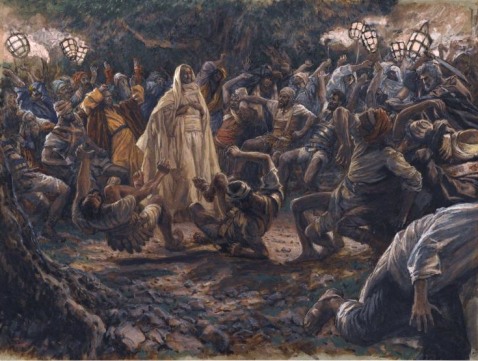
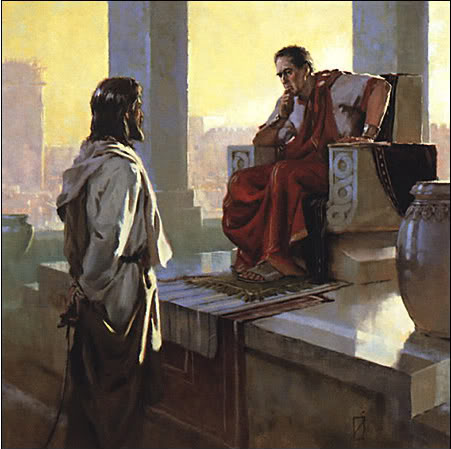


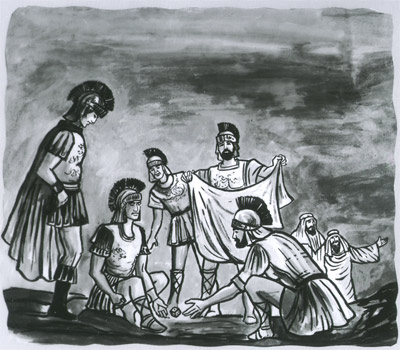
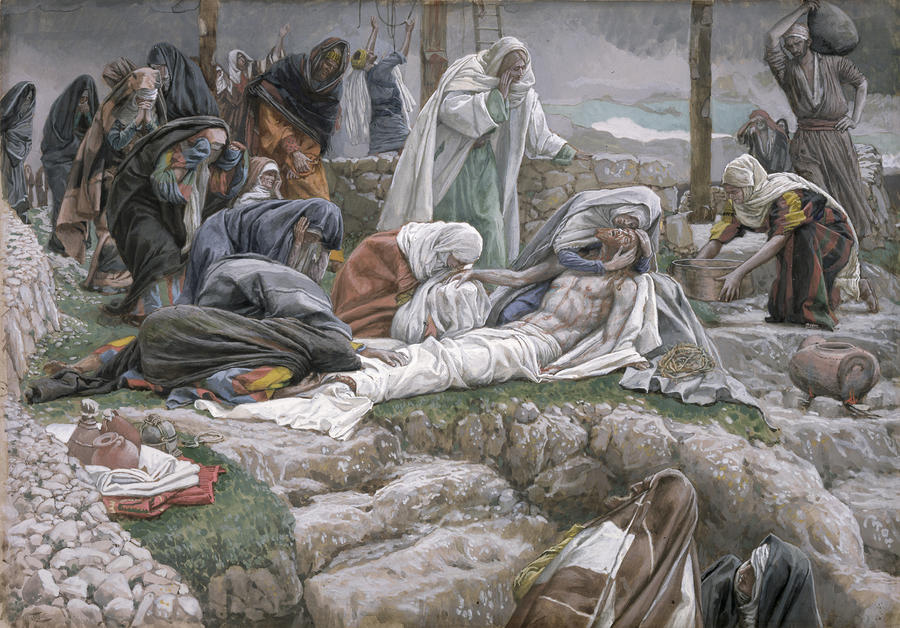

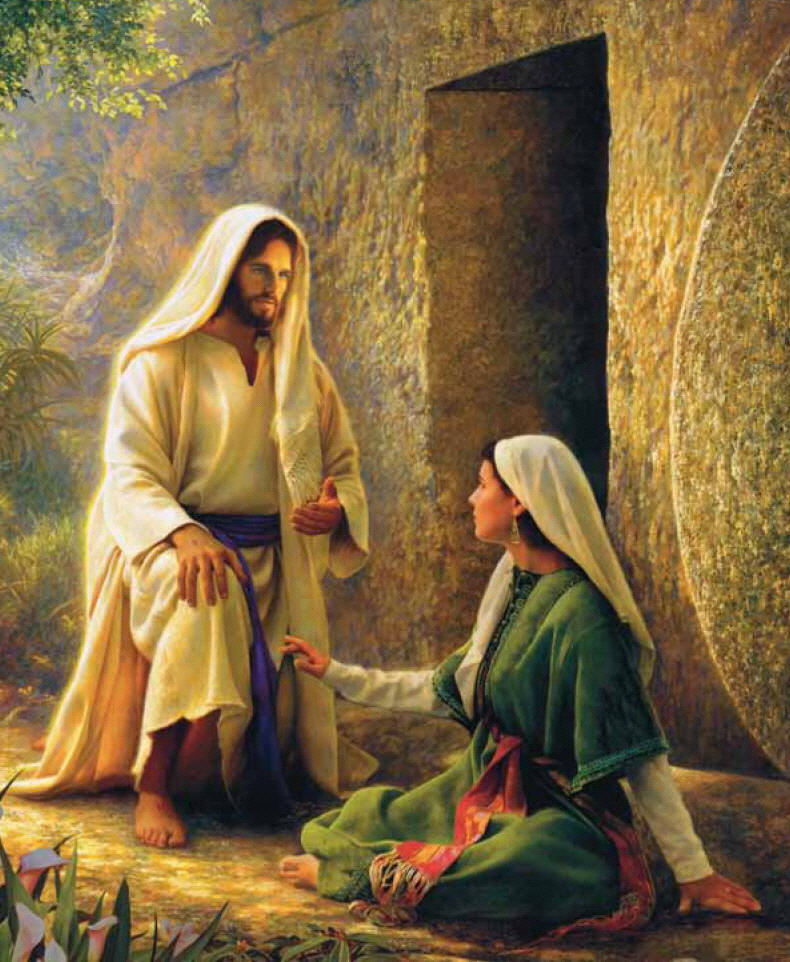
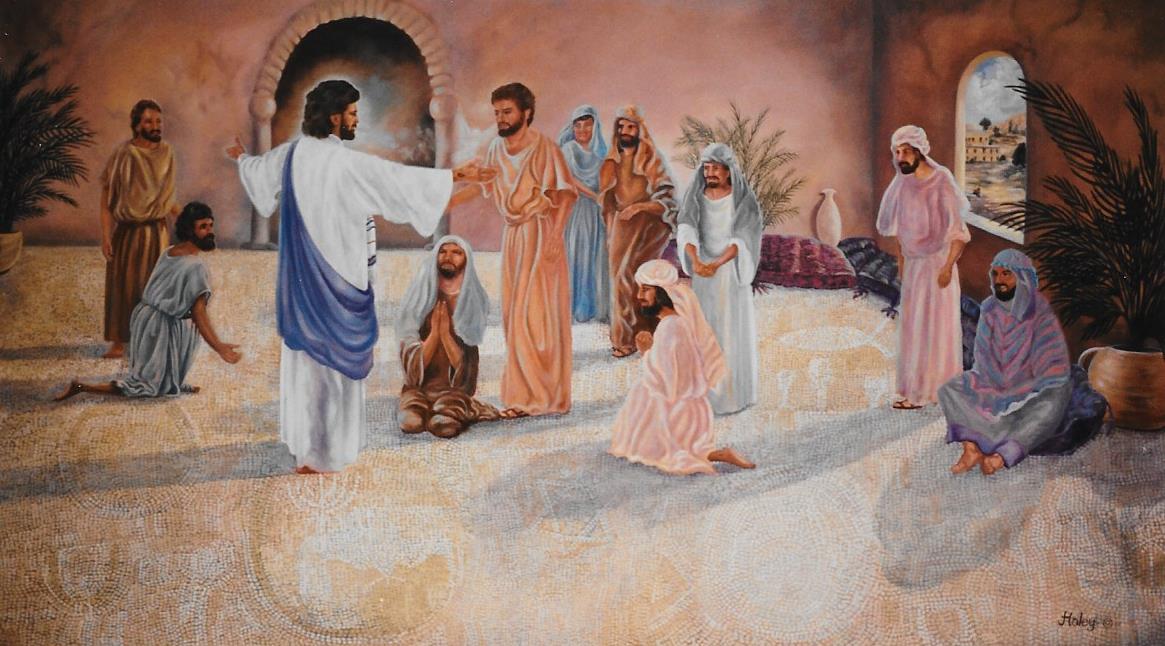



No comments:
Post a Comment